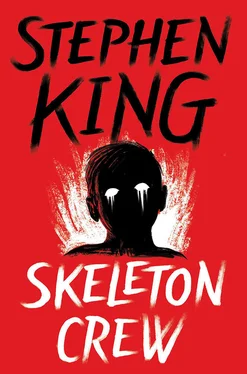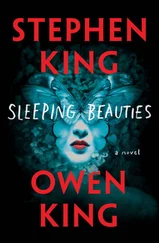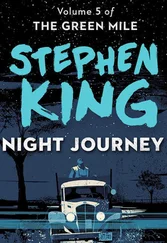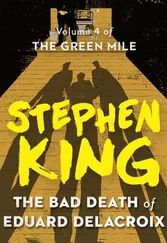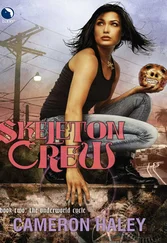Stephen King - Skeleton Crew
Здесь есть возможность читать онлайн «Stephen King - Skeleton Crew» весь текст электронной книги совершенно бесплатно (целиком полную версию без сокращений). В некоторых случаях можно слушать аудио, скачать через торрент в формате fb2 и присутствует краткое содержание. Город: New York, Год выпуска: 2016, ISBN: 2016, Издательство: Scribner, Жанр: Ужасы и Мистика, на английском языке. Описание произведения, (предисловие) а так же отзывы посетителей доступны на портале библиотеки ЛибКат.
- Название:Skeleton Crew
- Автор:
- Издательство:Scribner
- Жанр:
- Год:2016
- Город:New York
- ISBN:978-1-5011-4130-0
- Рейтинг книги:3 / 5. Голосов: 1
-
Избранное:Добавить в избранное
- Отзывы:
-
Ваша оценка:
- 60
- 1
- 2
- 3
- 4
- 5
Skeleton Crew: краткое содержание, описание и аннотация
Предлагаем к чтению аннотацию, описание, краткое содержание или предисловие (зависит от того, что написал сам автор книги «Skeleton Crew»). Если вы не нашли необходимую информацию о книге — напишите в комментариях, мы постараемся отыскать её.
Skeleton Crew — читать онлайн бесплатно полную книгу (весь текст) целиком
Ниже представлен текст книги, разбитый по страницам. Система сохранения места последней прочитанной страницы, позволяет с удобством читать онлайн бесплатно книгу «Skeleton Crew», без необходимости каждый раз заново искать на чём Вы остановились. Поставьте закладку, и сможете в любой момент перейти на страницу, на которой закончили чтение.
Интервал:
Закладка:
They stood in a circle in the storm, the dead of Goat Island, and the wind screamed around them, driving its packet of snow, and some kind of song burst from her. It went up into the wind and the wind carried it away. They all sang then, as children will sing in their high, sweet voices as a summer evening draws down to summer night. They sang, and Stella felt herself going to them and with them, finally across the Reach. There was a bit of pain, but not much; losing her maidenhead had been worse. They stood in a circle in the night. The snow blew around them and they sang. They sang, and —
— and Alden could not tell David and Lois, but in the summer after Stella died, when the children came out for their annual two weeks, he told Lona and Hal. He told them that during the great storms of winter the wind seems to sing with almost human voices, and that sometimes it seemed to him he could almost make out the words: “Praise God from whom all blessings flow/Praise Him, ye creatures here below…”
But he did not tell them (imagine slow, unimaginative Alden Flanders saying such things aloud, even to the children!) that sometimes he would hear that sound and feel cold even by the stove; that he would put his whittling aside, or the trap he had meant to mend, thinking that the wind sang in all the voices of those who were dead and gone… that they stood somewhere out on the Reach and sang as children do. He seemed to hear their voices and on these nights he sometimes slept and dreamed that he was singing the doxology, unseen and unheard, at his own funeral.
There are things that can never be told, and there are things, not exactly secret, that are not discussed. They had found Stella frozen to death on the mainland a day after the storm had blown itself out. She was sitting on a natural chair of rock about one hundred yards south of the Raccoon Head town limits, frozen just as neat as you please. The doctor who owned the Corvette said that he was frankly amazed. It would have been a walk of over four miles, and the autopsy required by law in the case of an unattended, unusual death had shown an advanced cancerous condition — in truth, the old woman had been riddled with it. Was Alden to tell David and Lois that the cap on her head had not been his? Larry McKeen had recognized that cap. So had John Bensohn. He had seen it in their eyes, and he supposed they had seen it in his. He had not lived long enough to forget his dead father’s cap, the look of its bill or the places where the visor had been broken.
“These are things made for thinking on slowly,” he would have told the children if he had known how. “Things to be thought on at length, while the hands do their work and the coffee sits in a solid china mug nearby. They are questions of Reach, maybe: do the dead sing? And do they love the living?”
On the nights after Lona and Hal had gone back with their parents to the mainland in Al Curry’s boat, the children standing astern and waving good-bye, Alden considered that question, and others, and the matter of his father’s cap.
Do the dead sing? Do they love?
On those long nights alone, with his mother Stella Flanders at long last in her grave, it often seemed to Alden that they did both.
Notes
Not everyone is interested in where short stories come from, and that is perfectly proper — you don’t have to understand the internal-combustion engine to drive a car, and you don’t need to know the circumstances which surrounded the making of a story to get a bit of pleasure from it. Engines interest mechanics; the creation of stories interests academics, fans, and snoops (the first and the last are almost synonymous, but never mind). I’ve included a few notes here on a few of the stories — such things as I thought might interest the casual reader. But if you’re even more casual than that, I assure you that you can close the book without a qualm — you won’t be missing much.
“The Mist” — This was written in the summer of 1976, for an anthology of new stories being put together by my agent, Kirby McCauley. McCauley had created another book of this sort, called Frights, two or three years previous. That book was a paperback. This one was to be a hardcover and much more ambitious in scope. It was called Dark Forces. Kirby wanted a story from me, and he pursued that story with doggedness, determination… and a kind of gentle diplomacy that is, I think, the hallmark of a really good agent.
I couldn’t think of a thing. The harder I thought, the more easily nothing came. I began to think that maybe the short-story machine in my head was temporarily or permanently broken. Then came the storm, which was much as described in this story. At the height of it there was indeed a waterspout on Long Lake in Bridgton, where we were living at the time, and I did insist that my family come downstairs with me for a while (although my wife’s name is Tabitha — Stephanie is her sister’s name). The trip to the market the next day was also much as described in the story, although I was spared the company of such an odious creature as Norton — in the real world, the people living in Norton’s summer cottage were a very pleasant doctor, Ralph Drews, and his wife.
In the market, my muse suddenly shat on my head — this happened as it always does, suddenly, with no warning. I was halfway down the middle aisle, looking for hot-dog buns, when I imagined a big prehistoric bird flapping its way toward the meat counter at the back, knocking over cans of pineapple chunks and bottles of tomato sauce. By the time my son Joe and I were in the checkout lane, I was amusing myself with a story about all these people trapped in a supermarket surrounded by prehistoric animals. I thought it was wildly funny — what The Alamo would have been like if directed by Bert I. Gordon. I wrote half the story that night and the rest the following week.
It got a little long, but Kirby thought it was good and it went into the book. I never liked it that much until the rewrite — I particularly didn’t like David Drayton sleeping with Amanda and then never finding out what happened to his wife. That seemed cowardly to me. But in the rewrite, I discovered a rhythm of language that I liked — and keeping that rhythm in mind, I was able to peel the story down to its basics more successfully than with some of my other long stories (“Apt Pupil” in Different Seasons is a particularly good example of this disease I have — literary elephantiasis).
The real key to this rhythm lay in the deliberate use of the story’s first line, which I simply stole from Douglas Fairbairn’s brilliant novel Shoot. The line is, for me, the essence of all story, a kind of Zen incantation.
I must tell you that I also liked the metaphor implied in David Drayton’s discovery of his own limitations, and I liked the story’s cheery cheesiness — you’re supposed to see this one in black-and-white, with your arm around your girl’s shoulders (or your guy’s), and a big speaker stuck in the window. You make up the second feature.
“Here There Be Tygers” — My first-grade teacher in Stratford, Connecticut, was Mrs. Van Buren. She was pretty scary. I guess if a tiger had come along and eaten her up, I could have gotten behind that. You know how kids are.
“The Monkey” — I was in New York City on business about four years ago. I was walking back to my hotel after visiting my people at New American Library when I saw a guy selling wind-up monkeys on the street. There was a platoon of them standing on a gray blanket he’d spread on the sidewalk at the corner of Fifth and Forty-fourth, all bending and grinning and clapping their cymbals. They looked really scary to me, and I spent the rest of my walk back to the hotel wondering why. I decided it was because they reminded me of the lady with the shears… the one who cuts everyone’s thread one day. So keeping that idea in mind, I wrote the story, mostly longhand, in a hotel room.
Читать дальшеИнтервал:
Закладка:
Похожие книги на «Skeleton Crew»
Представляем Вашему вниманию похожие книги на «Skeleton Crew» списком для выбора. Мы отобрали схожую по названию и смыслу литературу в надежде предоставить читателям больше вариантов отыскать новые, интересные, ещё непрочитанные произведения.
Обсуждение, отзывы о книге «Skeleton Crew» и просто собственные мнения читателей. Оставьте ваши комментарии, напишите, что Вы думаете о произведении, его смысле или главных героях. Укажите что конкретно понравилось, а что нет, и почему Вы так считаете.
